Five tips for choosing a robovac/mop might just save you from an expensive mistake. Rule #1 is that you cannot expect a robovac to do it all.
People have a love-hate relationship with robovacs. They love the ones that work, and hate those that don’t. But I have learned that, most of the time, it is because people buy the wrong robot for their needs.
Perhaps the most important tip is that you cannot expect most robovacs to do it all. Left unsupervised, they can be a disaster. You need to prepare the house for a robovac and understand that most will likely snag and choke on every errant charging cable, shoelace, children’s toy or rug tassel.
What are the basic differences?
When you go shopping for a robovac, you may not know what to look for. More than 30 brands/models are currently on offer – note that each generation includes features from previous generations.
Please read this guide and understand that there are at least five generations (we are not ready to declare 6th yet), and within those, there are must-have items and then nice to have.
CyberShacks’ testing methodology
We use a panel of testers with different floor types, single and multi-level and some with pets. Our real-world advice comes from over four years of experience with many robovacs.
Forgive the panel’s apparent snobbery, but they would not buy a Gen 1-4 robovac after experiencing actual whole-of-home, unattended cleaning of the 2024 and 2025 Gen 5 robovacs. 2025 has upped the ante now with roller mops, side mini-mop, extra suction power, improved apps and fast charging.
Detailed feature comparison – use this as your shopping list.
A blank square means it does not have that feature.
Robovac
| Item | Gen 1 DumBots | Gen 2 DimBots | Gen 3 AverageBots | Gen 4 BrainyBots | Gen 5 SmartBots |
| Price | <$500 | <$1000 | $1000-$1500 | $1500-$2000 | $2000+ |
| Format | Round | Round | Round | Round and Square | Mostly round |
| Navigation | Bumper | Bumper and 2D LiDAR | Bumper, 2D LiDAR and mapping | dToF and AI mapping | 360° LiDAR and AI mapping |
| Headlights | Nice to have | ||||
| Main brush size | 13cm | 13cm | 13cm | 13-17cm | 17cm |
| Pet-friendly zero tangle | ✅ | ✅ | |||
| LiDAR 2D 120-180° | ✅ | ✅ | |||
| LiDAR 3D 360° | ✅ Some now have turretless designs and 120° dToF | ✅ | |||
| Map | Pattern clean | ✅ Set basic no-go zones. | ✅ Editable | ✅ Set more comprehensive options. | ✅ Set more comprehensive options |
| Obstacle detection | dToF is better than forward IR detection | dTOF and IR structured light | |||
| Forward camera AI obstacle detection | ✅ A camera differentiates Gen 4 from Gen 5 | ||||
| AI recognition | At least 100 objects, which should include animal faeces. Some now use AI detection. | ||||
| Forward Bumper 180° obstacle detection | ✅ | ✅ | ✅ | ✅ | ✅ |
| IR front obstacle detection | ✅ | ✅ | ✅ | ||
| IR right-side obstacle detection | ✅ | ✅ | ✅ | ✅ | |
| IR left-side obstacle detection | Some | Many | |||
| IR Cliff Detection | 2 | 2 | 2 | 4 | 4 |
| Carpet Detection | ✅ | ✅ | |||
| Pascal suction maximum | 2000 | 2000 | 4000 | 5000-8000 | 12000+ |
| Auto-adjust suction speed | ✅ | ✅ | |||
| Right Edge Clean whisker | ✅ | ✅ | ✅ | ✅ | ✅ Some have an extendable right side mop pad. |
| Left Edge Clean whisker | Some | ||||
| Corner Clean | Mop pad extension on the right side | ||||
| Sill height negotiation | Some | 10-15mm | 20mm Some can do 40mm or more | ||
| Mop | Platen | Platen | Platen or rotary pads | Rotary pads. Some have a roller that is superior to other types. | |
| Mop lift over carpet | Some. Up to 10mm | Most are 10mm. Some up to 20mm | |||
| Mop pad extension on right side | Some |
Dock
| Item | Gen 1 | Gen 2 | Gen 3 | Gen 4 | Gen 5 |
| Self-empty dustbin dock | Few | Some | Yes | ||
| Water and wastewater container | Some | Yes | |||
| Base clean | Removable base plate | ||||
| Can be plumbed in | Some | Some | |||
| Return to the dock to clean and refill water. | Most | Yes | |||
| Mop Clean | Most | Most use hot water | |||
| Hot Air mop dry | Some | Yes | |||
| Floor clean solution dispenser | Some | Most have a dispenser. |
App
| Item | Gen 1 | Gen 2 | Gen 3 | Gen 4 | Gen 5 |
| Basic App | N/A | N/A | N/A | ||
| Fully featured App and AI | ✅ | ✅ | |||
| Multi-floor map | Some, if you move the base station to each floor. | Ditto, and up to five maps | Ditto | ||
| Intelligent, clean/mop | Uses AI to map cleaned areas and returns to areas not cleaned | Same | |||
| Voice control | Most have very limited Alexa, Google or Siri commands | Ditto. Ecovacs has Yiko that has many more commands | |||
| Area, room clean | Most | All | |||
| Schedule | Most with the option of selecting room order and multiple days | Ditto. | |||
| Maintenance tracking | ✅ | ✅ |
Five tips for choosing a robovac/mop
How do they see?
Generation 1 Dumbots do not see. They simply bump their way around the area and perform a set cleaning pattern. Don’t bother with these unless low cost is your driver.
Generation 2 Dimbots 2D LiDAR (Light Detection and Ranging radar) and SLAM (Simultaneous localisation and mapping software). Add to this collision bumper avoidance, which describes 90% of robovacs. Pro: lower cost. Con: No AI to improve the experience.
Generation 3 Averagebots add IR object detection sensors to LiDAR to reduce the need for bumper collision avoidance. Pro: What most people buy who don’t know what Gen 4 and Gen 5 can do.
Generation 4 Brainybots add 360° 3D LiDAR that can see around the robovac, and up and down, giving it a 3D image. They may also have more sensors (dToF and IR) and an Ultrasonic sensor (for carpet or hard floor detection). These are vastly superior in navigation and larger obstacle avoidance.
Generation 5 SmartBots rely heavily on AI and cameras for small object recognition. Some can even recognise and avoid pet poo and urine.

What are the different shapes?
Most are round, with about a 13-17cm rotating brush supplemented by one or two side whisker brushes. They usually have a mop attachment, which can be enabled by swapping the vacuum dust bin for a water tank and a static microfibre mop pad.
D-shape are harder to find and usually have a larger rotating brush that cleans faster. But this is not a big issue as round robovacs are getting faster and more powerful.

Some have a cleaning station that empties the robovac and charges it.


How do smarter robovacs know the areas to clean?
During the first setup, the Wi-Fi recharge base station acts as the ‘anchor’ for the robovac to build a map from and return to. Home Wi-Fi is typically 2.4Ghz with an effective indoor transmission distance of about 30 metres. If the robovac loses the signal, it cannot get home, so make sure you have decent Wi-Fi. Some are now mesh-aware.
90% of complaints about dropout are due to the cheap routers supplied by so many NBN resellers—see Crappy NBN FTTN Modem—here are a few better ones (guide).
Gen 4 or later, robovacs ‘see’ the area and track around all walls and fixed objects like furniture. This is stage one of its map – an outline drawing of your home. Next, it cleans the outer walls in each room, then in between those outlines using a zig-zag or U-shape cleaning pattern to finish the map. Once saved, you can name rooms, set no-go zones, set up schedules and get feedback on cleaning. If you have a multi-story home, you can carry the base station (or buy another) and repeat the process on different floors – most store about three maps.

What do you need to do to prepare for a robovac?
Gen 4 or later model robovacs are better at obstacle avoidance, but it is far better to prepare the home first. Let’s put it this way— few we have tested can complete the clean without some issues.
- Remove clothes/shoes/bags from the floor
- Tie up loose cables off the floor
- Lift dining chairs, stools, side tables, and wastebins off the ground
- Lift floor rugs (especially those with tassels) that could tangle in the brush
- Close doors to areas you don’t want to map or clean
Gen 1-3 robovacs don’t have carpet detection, so ensure no-go lines are drawn and doors are closed to carpeted areas, or it will mop them. This is a pain if you want to mop a bathroom off a carpeted bedroom.
Some Gen 4 and all Gen 5 have carpet detection and will lift the mop pads (usualy to 10mm).
Whole-of-home one-pass clean. Fact or fantasy?
Gen 5 robovacs have a mop/no mop feature and a carpet sensor to lift and turn off mopping/water while on the carpet. In theory, these can do a one-pass clean and mop on a mix of hard and carpeted floors.
In practice, carpet comes in many styles and pile heights. The lowest pile or sisal weave style requires a 7-10mm lift to avoid the mopping pads. A longer pile will require the mopping pads to be removed.
Battery Life
Most can go for at least an hour or 100m2 of cleaning. Then they need a recharge – typically 4-6 hours. The better ones restart and continue cleaning.
How good are they?
No matter what any salesperson or website hypes, a robovac does not substitute for a traditional vacuum or mop. You will still have to vacuum stairs and around edges. It comes down to how acceptable that is to you.
Obstacle avoidance
This is done by IR sensors (OK) or a camera with AI (better). Generally, Gen 5 robovacs with a camera, IR sensors (sometimes called structured light), and object recognition (100 or more objects) are capable of recognising down to 25 x 25mm Lego at up to 30cm in front. Smaller objects like cables, shoelaces, etc., may not be seen. The better ones will also detect liquids and take the appropriate measures (See Pets).
Under cupboard overhangs or low furniture
Most robovacs are around 100mm high and usually do not fit under cupboard overhangs or low furniture like beds. Some are now around 80mm and have a turret-less design.
Carpet lift
Most will lift 10mm and some up to 18mm over carpet.
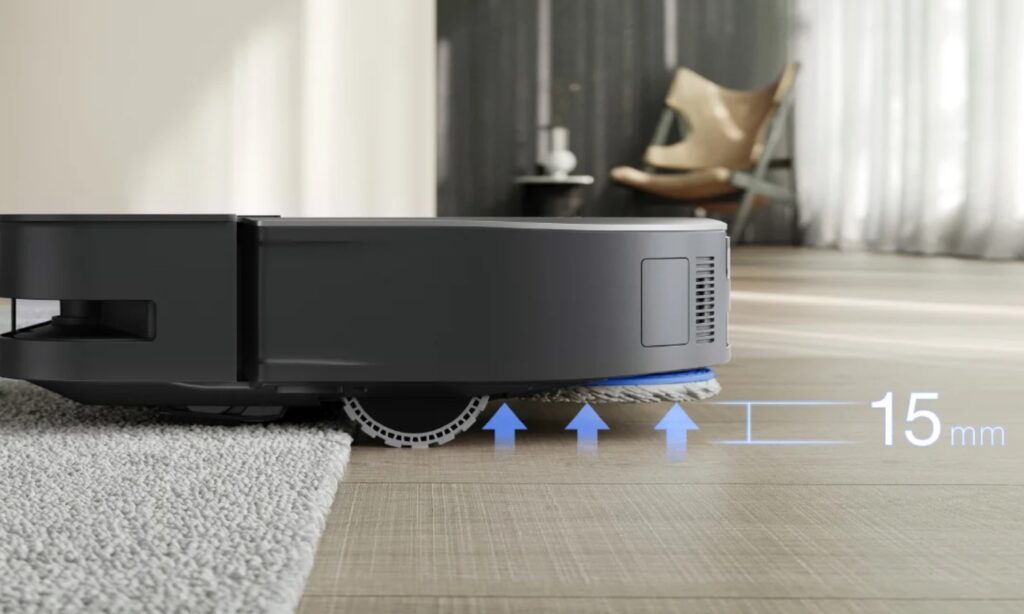
Sill negotation
Most will get over a 20mm sill. Some now can do 40mm or more.
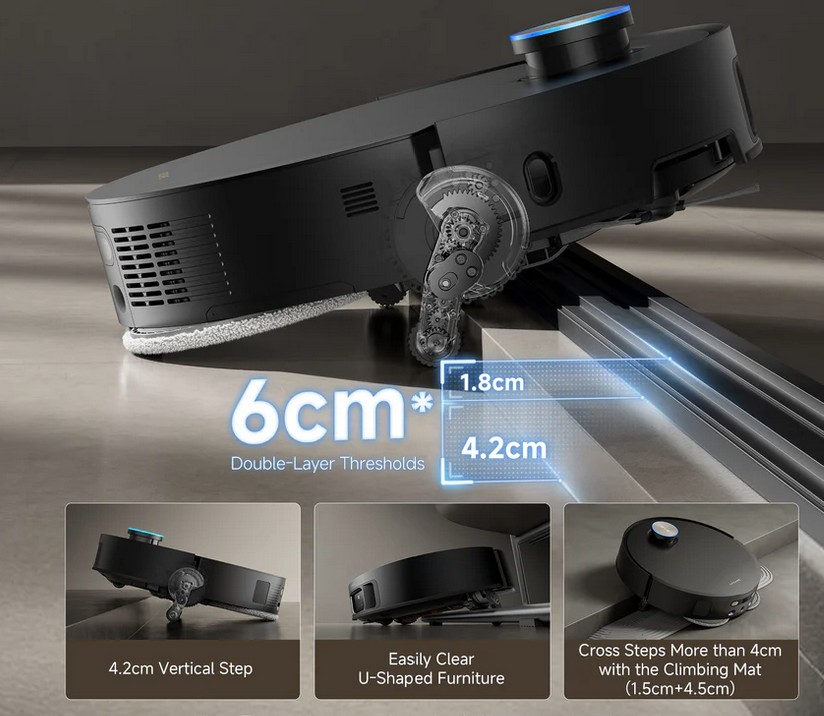
Edge Clean
Most robovacs are unable to reach closer than 5-10mm from an edge. Some have an extendable right whisker and mop pad, which gets to 1-5mm on hard floors.
But these don’t edge-clean on carpet. The average robovac with a 13cm brush has around a 110mm gap.
Corner clean
No round robovac can clean corners – the physics just don’t work. While the extendable right whisker may get some detritus, it is far from efficient.
Vacuum efficiency
Robovacs generally have 5,000 to 20,000 Pascal (Pa) suction power, but frankly, the figure is just about bragging rights. In reality, the rotating brush in concert with the vacuum and the mop cleans the floor.
All robovacs are reasonably efficient on hard surfaces, from tiles to laminated timber, but they can be inefficient on carpet. Forget feature carpets or shag pile. Most Gen 1-3 robovacs do very poorly on carpet.
For hard floors, 5000-10,000 Pa is fine.
For carpets, 10,000-20,000Pa will get a better result. But few have rotating brushes that beat the carpet to bring out the dust and detritus. Most Gen 4 and 5 will have a carpet sensor to increase suction power.
Pets
If you have pets, you need to get a Gen 5 with a pet program and the ability to identify pet poo and urine. When they encounter this the vacuum and rotating brush stops and lifts leaving the mop to handle things. Without this the mess would be sprad though the robovac.

Tests
We use 100g of test detritus, ranging from sand to NutriGrain test efficiency. We don’t count the edges in the test.
- Hardfloors: Most will pick up 80-90% with a single pass, and some get to 90+% with two passes.
- Short pile carpet (5-7mm): Most will only pick up 50-60% on one pass and will get to 60-70% on two passes.
- Medium pile (7-10mm): Most will pick up less than short pile
- Long pile (10mm+): Few have the power to vacuum more than 30%
By comparison, Dyson Gen5detect – the evolution continues counts both the dust size particles and the amount collected. It gets close to 100%.
The point is that our panel are happy with lower carpet performance because they usually use 2X passes and schedule the robovac to work at least twice weekly.


Rotating brush
There is a real science to rotating brushes. Some use one, some use two that counter rotate, and most have a cutting comb (or similar) to remove pet and human hair. Some have floating brushes and auto lift. This is far more important for carpets.
The wider the brush, the fewer overlapping passes it needs to make. A 35cm robot with a 13cm brush has 110cm on either side, so it is not able to vacuum in one pass. These require more overlapping passes and will be slower, using more battery.
The majority have the brush between the wheels, but some D-shape have wider brushes in front.
Bushes with both rubber bristles clean more effectively.
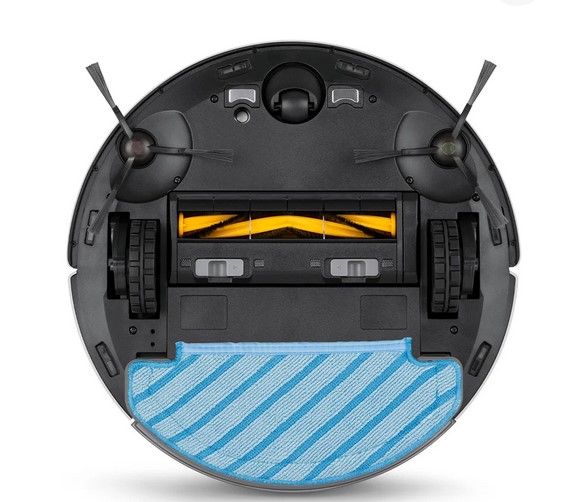
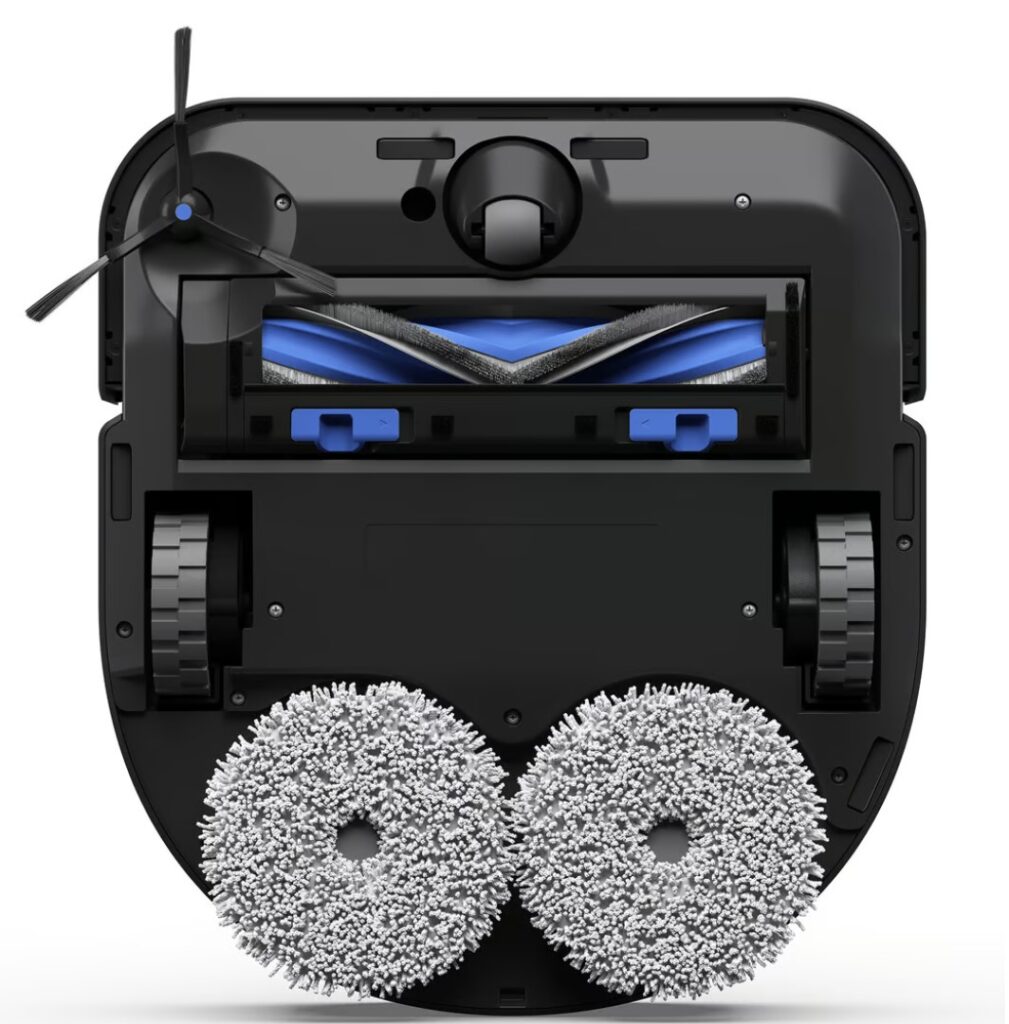
Robomops are, at best, a maintenance mop
Platten mops
They typically drag a wet microfibre cloth around that lacks the ‘elbow grease’ needed to remove dried milk/coffee/soft drink stains and cut through grime. Without frequent cleaning the mop drags dirty water and loses effectiveness.
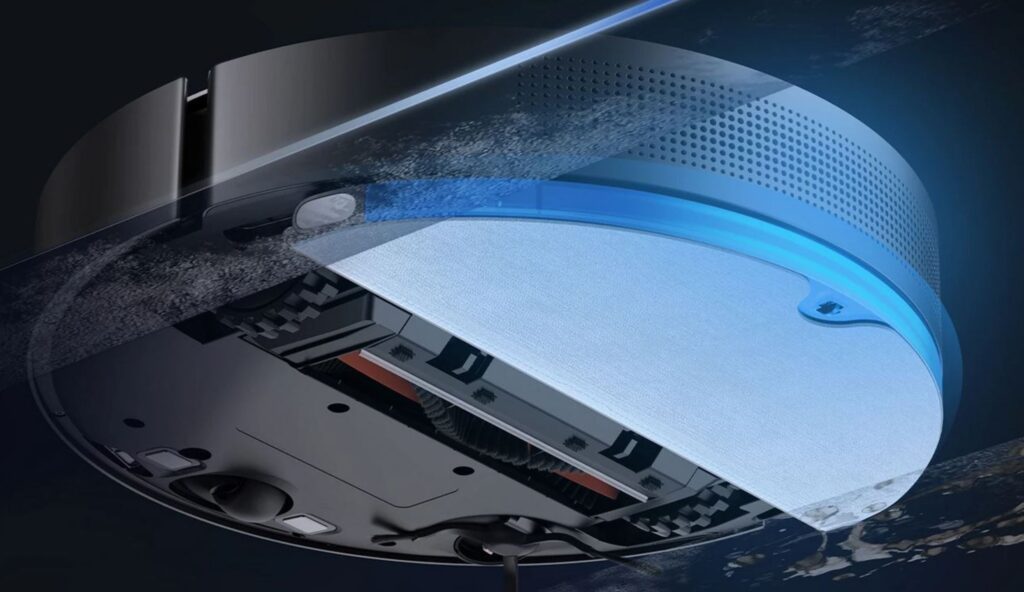
The exception is that some Gen 4 and 5 have vibrating plattens
Rotating mops
Most Gen 4 and 5 have dual rotating pads and a downward pulsating force to add elbow grease to mopping. Some have extendable right side mop pads and whiskers.
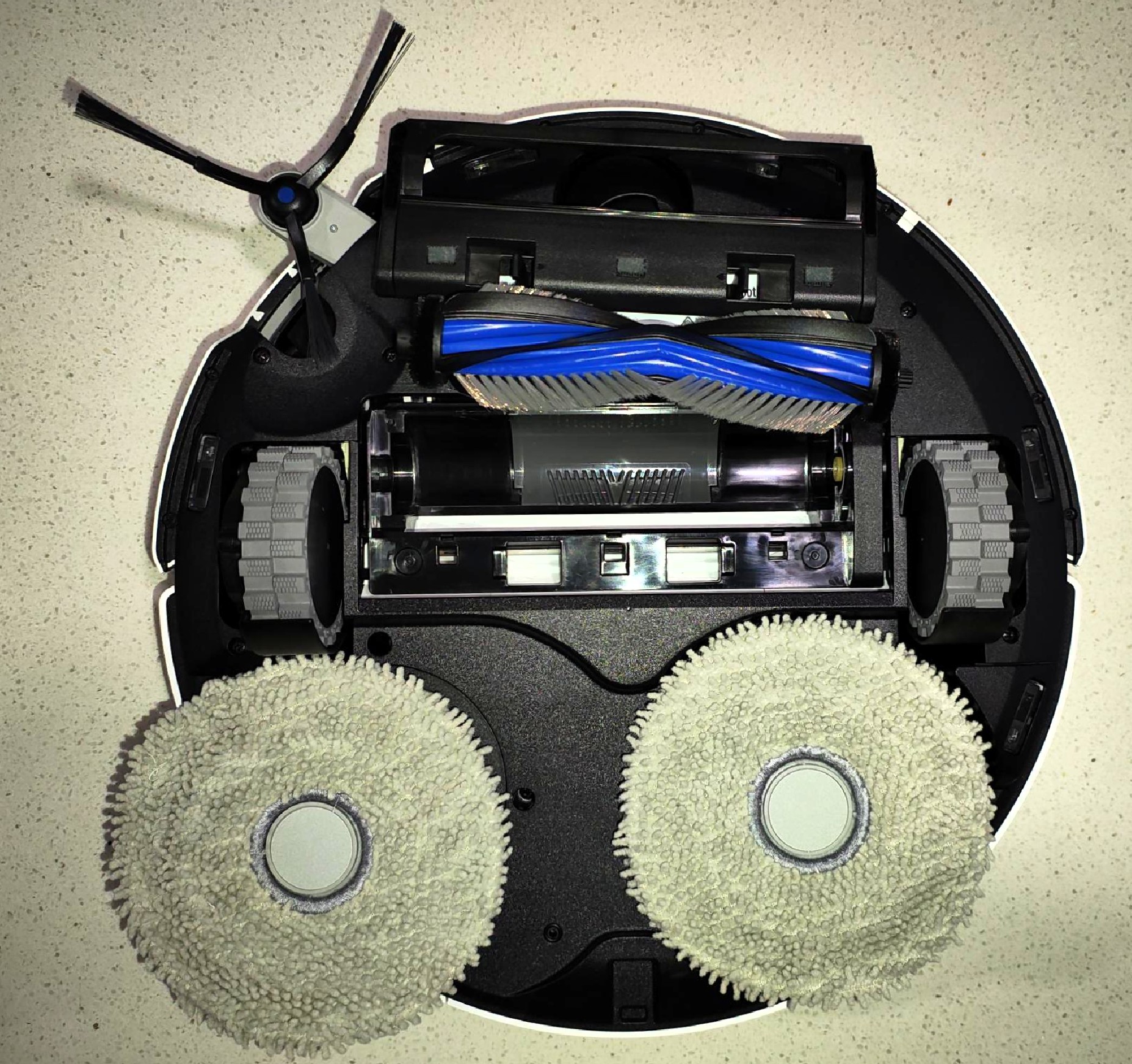
Roller Mops
These either have a full-width roller or an extendable roller. These provide the best mopping experience.
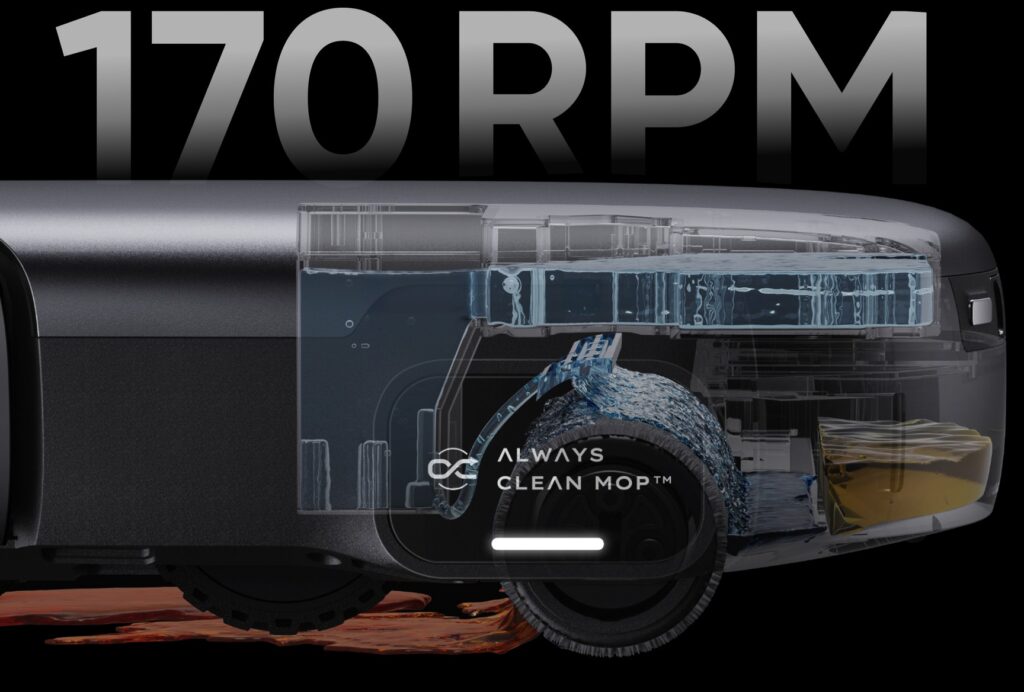
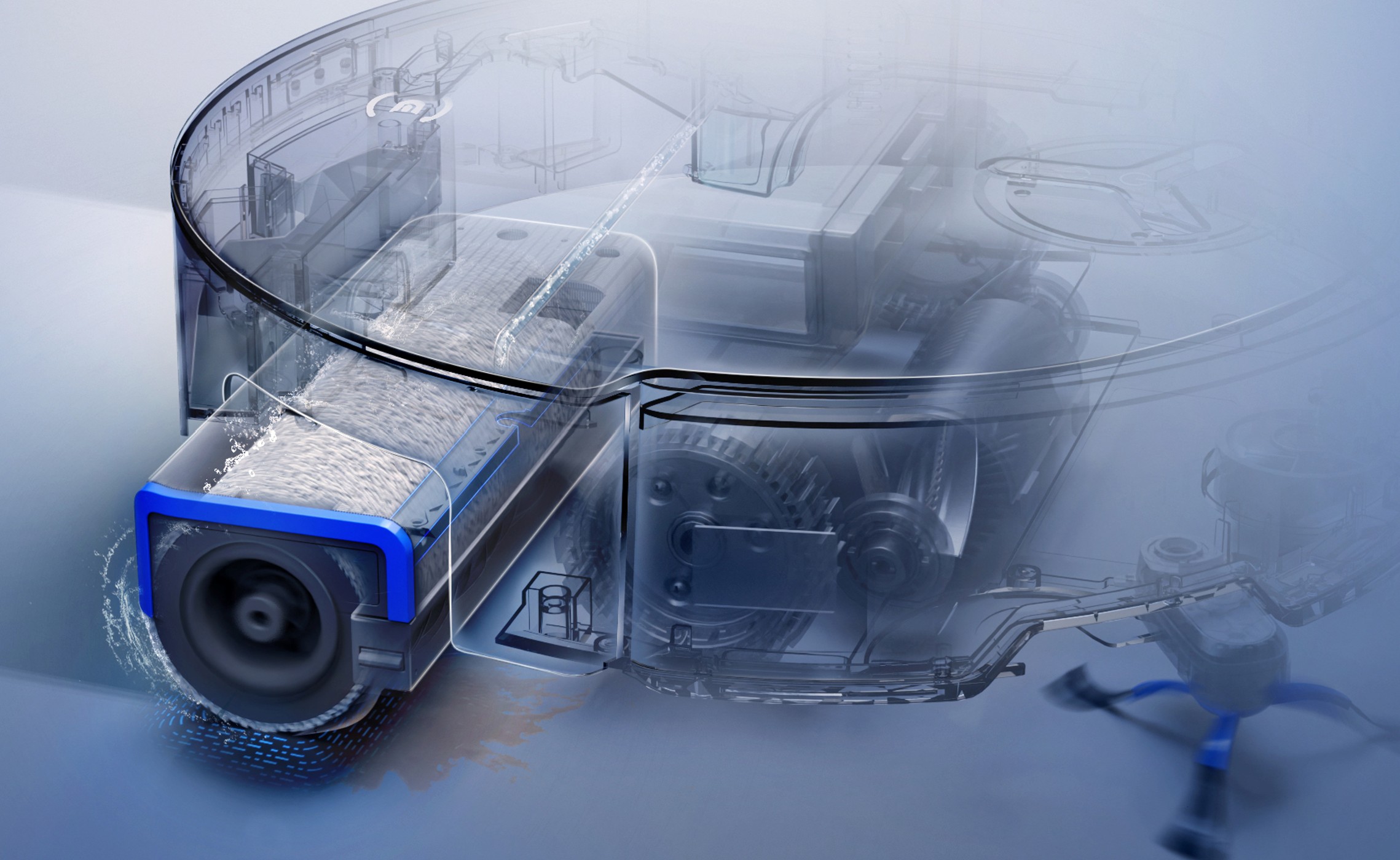
Reading
Five tips for choosing a cordless power mop (guide)
CyberShack robovac news and reviews
Update – CyberShack’s view 2025
We have reviewed most of the better robovacs – at least Generation 4 or 5 this year. There is a definite improvement in AI navigation and AI/Camera obstacle avoidance, including pet poo.
ECOVACS DEEBOT X8 PRO OMNI – new extendable roller mop (Gen 5 extendable roller mop)
ECOVACS DEEBOT T50 MAX PRO OMNI – more grunt, still a great price (Value Gen 5, carpet BLAST suction)
ECOVACS DEEBOT T50 PRO OMNI – clever robot vacuum/mop at an even better price (Value Gen 5)
Ecovacs DEEBOT N20 Plus – budget robot vacuum/mop sucks it in (Gen 3 platten – good for carpet)
Roborock Saros 10 – the thinnest, smartest robot vacuum/mop (Gen 5 platten with many advanced features like a side mini-mop)
Dreame X50 Ultra – a leap ahead (Gen 5 – the most fully featured with excellent pet programs)
Eufy S1 Pro – the robot vacuum/mop that rewrites the book (a full-width roller mop and ozonated water cleaning – hard to beat)
Eufy 3-in-1 E20 robot, stick and handheld vacuum (Gen 3 transformer to a stick vac)
Narwal Freo Z Ultra raises the AI bar for Gen 5 robot vac/mops (Gen 5 advanced with excellent pet programs).
Resources
Five tips for choosing a robovac/mop



14 comments
Judy West
I have the EcoVac T30 for 5 months and had issues with the sensors. I have had to send it back for repairs. I love the work it does, however you have to clean the Robot Vac as this accumulates carpet fibers and dog hairs in the roller & filters and also the inside the docking station needs cleaning regularly. So keep in mind you need to clean the robovac to keep it maintained for full efficiency.
Ray Shaw
Thanks for the feedback. In each review, we have a section on maintenance, and I will make sure your advice is reflected there.
Stephanie
I think I will stick with my cleaner she does a great job. In between times I manage. L7fting the furniture each time and difficult going from Persian carpet to tiles might be an issue. Great for some not me. Great article thanks
Ray Shaw
I love the dry humour and totally agree – let someone else do it.
Terry
You mentioned Dyson but didn’t review it. Have I missed something?
Ray Shaw
Dyson no longer participates in ‘real’ review programs anymore. We have tried to get them back, but they seem unwilling to undergo our deep-dive review testing.
Wayne Laughton
Seems Gen 4/5 Robo cleaners are both Vacuum and Mops. Are there any that are purely vacuums?
Ray Shaw
You can set the app to vacuum only if you have carpet. Carpet needs a strong Pa suction so look at the Ecovacs T50 MAX.
Chris Wignall
Hi Team, great article and good work on the radio show and newsletter.
It would be great to see an update of this article and looking forward seeing the completed review of the Ecovacs T50 Pro OMNI.
Ray Shaw
Ecovacs T50 Pro and Max this week.
Chris Wignall
Thanks, I have never had a robot cleaner and just trying to decide if I get one and if so which one. I mostly have floorboards, tiles and a couple of rugs.
Ray Shaw
Hi Chris
Sorry for the delay. Read this first https://cybershack.com.au/guides/five-tips-for-choosing-a-robovac-mop/
Pretty well every Gen 4 or 5 robot does a good job on hard floors. What is your budget?
Chris Wignall
Hi Ray and team great work getting these updated articles out. Budget is sub $2,000 and so far it looks like the ecovacs t50 Omni pro or t50 max pro are looking good.
Ray Shaw
If you have lots of carpet the T50 Max is bnest but if you have mainly hard floors the T50 Pro is very good.